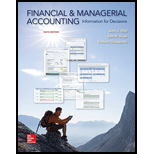
Concept explainers
Activity Based Costing:
Method of recognizing activities in the organization and allotment of cost of each activity thereto is known as activity based costing.
To explain: In comparison to traditional cost system and when there are batch level or product level costs, an activity based costing system shifts costs.
Explanation of Solution
b.
Usually activity based costing system shifts costs from high volume to low volume products due to usage of product level or batch level.
Hence, option b is correct.
a.
cost gets shifted low volume to high volume products in traditional methods due to usage of direct labor hours or machine hours.
c.
Shifting of cost from standardized to specialized products under activity based costing is not taken into accounts due to less usage of it.
d.
Activity based costing system does not facilitates specialized to standardized products due to non emphasizing on it, rather this considers product level.
Want to see more full solutions like this?
Chapter 17 Solutions
Financial and Managerial Accounting: Information for Decisions
- Help pleasearrow_forwardPlease provide problem with accounting questionarrow_forwardJuan Leon Martinez posted Apr 7, 2025 11:25 AM Subscribe Hello everyone, Esteban is not performing in a professional manner in this scene. In fact, he is showing extreme unprofessional manners and unethical work ethic. Under no circumstance should he be using a company's tools or assets for his own benefit. You can also see he is trying not to get caught by any upper management due to him doing these actions after hours of work. As a manager, a great change I would do differently to make sure Esteban is not using the company's assets for their own benefit, would be coachings and sit down conversations. A sit down conversation can have the employee get an idea on how bad his actions are towards the company. This disciplinary of a coaching would be a written down statement from both manager and employee stating that he or she understands the actions they have done, which could lead to suspension or possibly termination. These unethical actions could lead to a great deal of financial loss…arrow_forward

 AccountingAccountingISBN:9781337272094Author:WARREN, Carl S., Reeve, James M., Duchac, Jonathan E.Publisher:Cengage Learning,
AccountingAccountingISBN:9781337272094Author:WARREN, Carl S., Reeve, James M., Duchac, Jonathan E.Publisher:Cengage Learning, Accounting Information SystemsAccountingISBN:9781337619202Author:Hall, James A.Publisher:Cengage Learning,
Accounting Information SystemsAccountingISBN:9781337619202Author:Hall, James A.Publisher:Cengage Learning, Horngren's Cost Accounting: A Managerial Emphasis...AccountingISBN:9780134475585Author:Srikant M. Datar, Madhav V. RajanPublisher:PEARSON
Horngren's Cost Accounting: A Managerial Emphasis...AccountingISBN:9780134475585Author:Srikant M. Datar, Madhav V. RajanPublisher:PEARSON Intermediate AccountingAccountingISBN:9781259722660Author:J. David Spiceland, Mark W. Nelson, Wayne M ThomasPublisher:McGraw-Hill Education
Intermediate AccountingAccountingISBN:9781259722660Author:J. David Spiceland, Mark W. Nelson, Wayne M ThomasPublisher:McGraw-Hill Education Financial and Managerial AccountingAccountingISBN:9781259726705Author:John J Wild, Ken W. Shaw, Barbara Chiappetta Fundamental Accounting PrinciplesPublisher:McGraw-Hill Education
Financial and Managerial AccountingAccountingISBN:9781259726705Author:John J Wild, Ken W. Shaw, Barbara Chiappetta Fundamental Accounting PrinciplesPublisher:McGraw-Hill Education





